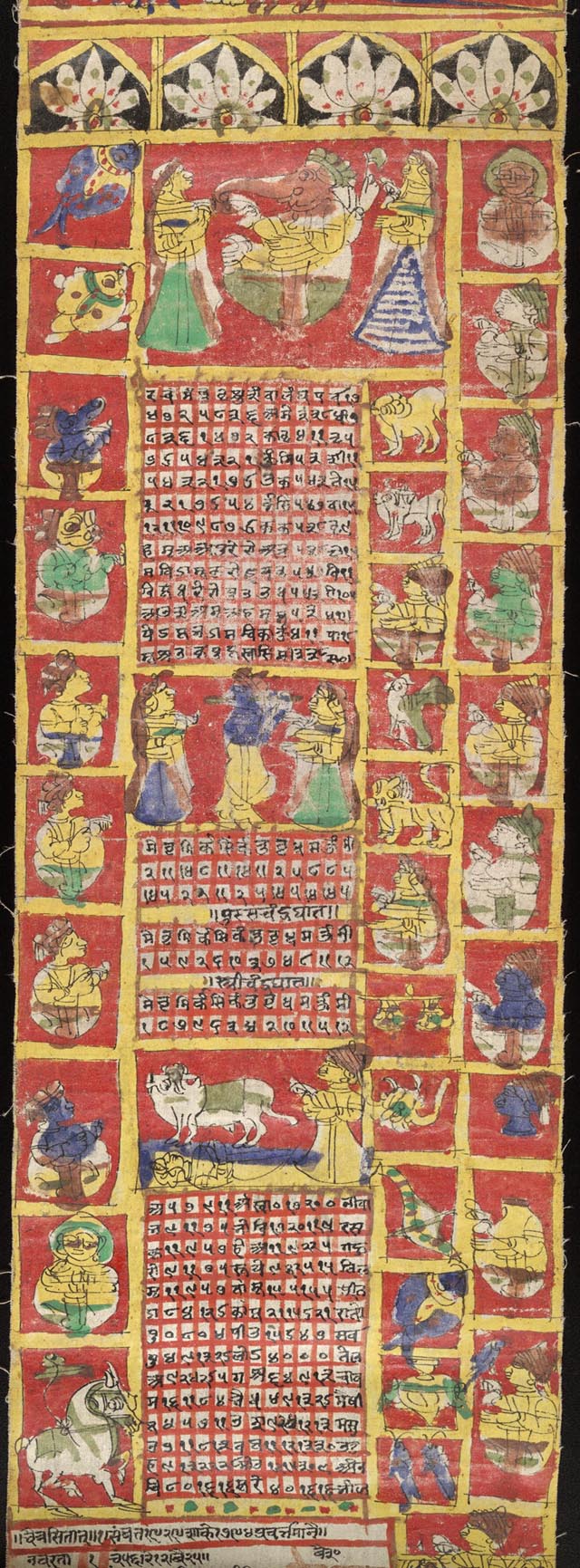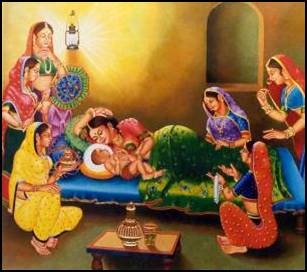|
Jaya (Jeevuba)
Jeevuba, otherwise known as Motiba, Poonamatiba (name given since she was born on Poonam), and Jaya, was born in 1785 ( Samvat (calendars) year 1841). Her father's name was Abhel Khachar and she had many siblings including a younger sister named Lalita. She was a very staunch devotee of Swaminarayan. Biography As legend goes, Jeevuba offered food to the idol of Swaminarayan and he accepted the food. Abhel Khachar wondered who this "Swaminarayan" was and sought after to see if he was actually a God. He threatened Jeevuba, who was praying to this 'God', and said that Swaminarayan must come and accept the food given or else he would kill her with his sword. Jeevuba peacefully served Swaminarayan and a miracle occurred. Swaminarayan actually came and accepted her food. Abhel Khacher was left speechless. Another time, Abhel Khachar wanted to get his daughter, Jeevuba, married. Jeevuba didn't want to get married and wanted to live life as a worshiper of Swaminarayan. Abhel forced her ... [...More Info...] [...Related Items...] OR: [Wikipedia] [Google] [Baidu] |
Samvat (calendars)
The Hindu calendar, Panchanga () or Panjika is one of various lunisolar calendars that are traditionally used in the Indian subcontinent and Southeast Asia, with further regional variations for social and Hindu religious purposes. They adopt a similar underlying concept for timekeeping based on sidereal year for solar cycle and adjustment of lunar cycles in every three years, but differ in their relative emphasis to moon cycle or the sun cycle and the names of months and when they consider the New Year to start. Of the various regional calendars, the most studied and known Hindu calendars are the Shalivahana Shaka (Based on the King Shalivahana, also the Indian national calendar) found in the Deccan region of Southern India and the Vikram Samvat (Bikrami) found in Nepal and the North and Central regions of India – both of which emphasize the lunar cycle. Their new year starts in spring. In regions such as Tamil Nadu and Kerala, the solar cycle is emphasized and this is c ... [...More Info...] [...Related Items...] OR: [Wikipedia] [Google] [Baidu] |
Swaminarayan
Swaminarayan ( IAST: ', 3 April 1781 – 1 June 1830), also known as Sahajanand Swami, was a yogi and ascetic, who is believed by followers to be a manifestation of God Krishna, or as the highest manifestation of Purushottam, and around whom the Swaminarayan Sampradaya developed. In 1800, he was initiated into the ''Uddhav'' ''sampradaya'' by his guru, Swami Ramanand, and was given the name Sahajanand Swami. Despite opposition, in 1802 Ramanand handed over the leadership of the Uddhav Sampraday to him before his death. According to the Swaminarayan-tradition, Sahajanand Swami became known as Swaminarayan, and the Uddhav Sampraday as the Swaminarayan Sampradaya, after a gathering in which he taught the Swaminarayan Mantra to his followers. He emphasized "moral, personal, and social betterment," and ''ahimsa'', and is also remembered within the sect for undertaking reforms for women and the poor, and performing non-violent yajñas (fire sacrifices) on a large scale. ... [...More Info...] [...Related Items...] OR: [Wikipedia] [Google] [Baidu] |
Buttermilk
Buttermilk is a fermented dairy drink. Traditionally, it was the liquid left behind after churning butter out of cultured cream. As most modern butter in western countries is not made with cultured cream but uncultured sweet cream, most modern buttermilk in western countries is cultured separately. It is common in warm climates where unrefrigerated milk sours quickly. Buttermilk can be drunk straight, and it can also be used in cooking. In making soda bread, the acid in buttermilk reacts with the raising agent, sodium bicarbonate, to produce carbon dioxide which acts as the leavening agent. Buttermilk is also used in marination, especially of chicken and pork. Traditional buttermilk Originally, buttermilk referred to the liquid left over from churning butter from cultured or fermented cream. Traditionally, before the advent of homogenization, the milk was left to sit for a period of time to allow the cream and milk to separate. During this time, naturally occurring ... [...More Info...] [...Related Items...] OR: [Wikipedia] [Google] [Baidu] |
Diarrhea
Diarrhea, also spelled diarrhoea, is the condition of having at least three loose, liquid, or watery bowel movements each day. It often lasts for a few days and can result in dehydration due to fluid loss. Signs of dehydration often begin with loss of the normal stretchiness of the skin and irritable behaviour. This can progress to decreased urination, loss of skin color, a fast heart rate, and a decrease in responsiveness as it becomes more severe. Loose but non-watery stools in babies who are exclusively breastfed, however, are normal. The most common cause is an infection of the intestines due to either a virus, bacterium, or parasite—a condition also known as gastroenteritis. These infections are often acquired from food or water that has been contaminated by feces, or directly from another person who is infected. The three types of diarrhea are: short duration watery diarrhea, short duration bloody diarrhea, and persistent diarrhea (lasting more than two wee ... [...More Info...] [...Related Items...] OR: [Wikipedia] [Google] [Baidu] |
Krishna
Krishna (; sa, कृष्ण ) is a major deity in Hinduism. He is worshipped as the eighth avatar of Vishnu and also as the Supreme god in his own right. He is the god of protection, compassion, tenderness, and love; and is one of the most popular and widely revered among Indian divinities. Krishna's birthday is celebrated every year by Hindus on Krishna Janmashtami according to the lunisolar Hindu calendar, which falls in late August or early September of the Gregorian calendar. The anecdotes and narratives of Krishna's life are generally titled as ''Krishna Leela''. He is a central character in the ''Mahabharata'', the '' Bhagavata Purana'', the '' Brahma Vaivarta Purana,'' and the '' Bhagavad Gita'', and is mentioned in many Hindu philosophical, theological, and mythological texts. They portray him in various perspectives: as a god-child, a prankster, a model lover, a divine hero, and the universal supreme being. Quote: "Krsna's various appearances as ... [...More Info...] [...Related Items...] OR: [Wikipedia] [Google] [Baidu] |
Rama
Rama (; ), Ram, Raman or Ramar, also known as Ramachandra (; , ), is a major deity in Hinduism. He is the seventh and one of the most popular ''avatars'' of Vishnu. In Rama-centric traditions of Hinduism, he is considered the Supreme Being. Rama is said to have been born to Kaushalya and Dasharatha in Ayodhya, the ruler of the Kingdom of Kosala. His siblings included Lakshmana, Bharata (Ramayana), Bharata, and Shatrughna. He married Sita. Though born in a royal family, their life is described in the Hindu texts as one challenged by unexpected changes such as an exile into impoverished and difficult circumstances, ethical questions and moral dilemmas. Of all their travails, the most notable is the kidnapping of Sita by demon-king Ravana, followed by the determined and epic efforts of Rama and Lakshmana to gain her freedom and destroy the evil Ravana against great odds. The entire life story of Rama, Sita and their companions allegorically discusses duties, rights and social ... [...More Info...] [...Related Items...] OR: [Wikipedia] [Google] [Baidu] |
1785 Births
Events January–March * January 1 – The first issue of the '' Daily Universal Register'', later known as ''The Times'', is published in London. * January 7 – Frenchman Jean-Pierre Blanchard and American John Jeffries travel from Dover, England to Calais, France in a hydrogen gas balloon, becoming the first to cross the English Channel by air. * January 11 – Richard Henry Lee is elected as President of the U.S. Congress of the Confederation.''Harper's Encyclopaedia of United States History from 458 A. D. to 1909'', ed. by Benson John Lossing and, Woodrow Wilson (Harper & Brothers, 1910) p167 * January 20 – Battle of Rạch Gầm-Xoài Mút: Invading Siamese forces, attempting to exploit the political chaos in Vietnam, are ambushed and annihilated at the Mekong River, by the Tây Sơn. * January 27 – The University of Georgia in the United States is chartered by the Georgia General Assembly meeting in Savannah. The first students are a ... [...More Info...] [...Related Items...] OR: [Wikipedia] [Google] [Baidu] |
1860 Deaths
Year 186 ( CLXXXVI) was a common year starting on Saturday (link will display the full calendar) of the Julian calendar. At the time, it was known as the Year of the Consulship of Aurelius and Glabrio (or, less frequently, year 939 ''Ab urbe condita''). The denomination 186 for this year has been used since the early medieval period, when the Anno Domini calendar era became the prevalent method in Europe for naming years. Events By place Roman Empire * Peasants in Gaul stage an anti-tax uprising under Maternus. * Roman governor Pertinax escapes an assassination attempt, by British usurpers. New Zealand * The Hatepe volcanic eruption extends Lake Taupō and makes skies red across the world. However, recent radiocarbon dating by R. Sparks has put the date at 233 AD ± 13 (95% confidence). Births * Ma Liang, Chinese official of the Shu Han state (d. 222) Deaths * April 21 – Apollonius the Apologist, Christian martyr * Bian Zhang, Chinese official and ... [...More Info...] [...Related Items...] OR: [Wikipedia] [Google] [Baidu] |
Indian Women Religious Leaders
Indian or Indians may refer to: Peoples South Asia * Indian people, people of Indian nationality, or people who have an Indian ancestor ** Non-resident Indian, a citizen of India who has temporarily emigrated to another country * South Asian ethnic groups, referring to people of the Indian subcontinent, as well as the greater South Asia region prior to the 1947 partition of India * Anglo-Indians, people with mixed Indian and British ancestry, or people of British descent born or living in the Indian subcontinent * East Indians, a Christian community in India Europe * British Indians, British people of Indian origin The Americas * Indo-Canadians, Canadian people of Indian origin * Indian Americans, American people of Indian origin * Indigenous peoples of the Americas, the pre-Columbian inhabitants of the Americas and their descendants ** Plains Indians, the common name for the Native Americans who lived on the Great Plains of North America ** Native Americans in the Uni ... [...More Info...] [...Related Items...] OR: [Wikipedia] [Google] [Baidu] |




